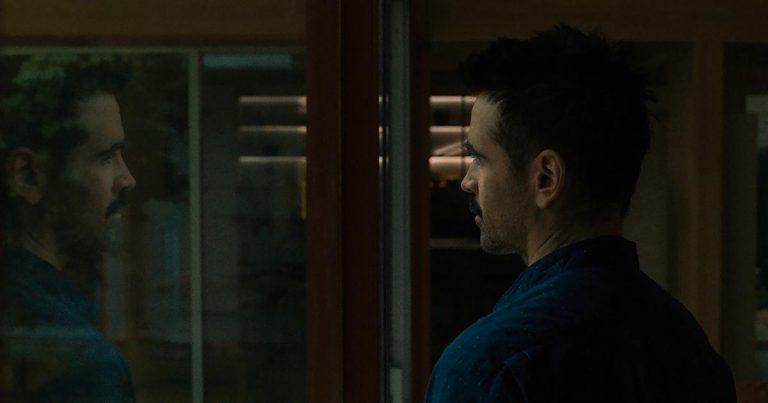
All works of art focus on territories that have been tread on by many other artists before them. If you’re attached the methods of a classic piece to convey a specific message, you might be adverse to a newer attempt that aims to shed light on the same subject. While it is easy to still enjoy new views on maybe just a visceral level (for example), it takes a clever mind to open up new avenues to that familiar theme. With his second feature narrative, writer and director Kogonada has done just that in, After Yang.
In the undefined future, android like creations are available for people to procure as companions for those in need. Jake and Kyra (Colin Farrell and Jodie Tuner-Smith) bought Yang (Justin H. Min) to be an older brother to the daughter they adopted, Mika (Malea Emma Tjandrawidjaja). In their eyes, Yang was a way to keep Mika knowledgeable and connected to her Chinese roots. Yet to Mika, he is nothing more than the brother she loves. One day, after Yang unexpectedly shuts down, Jake learns more about Yang than he thought existed while attempting to have him fixed.
Yes, in so many ways this is science fiction. But this isn’t some neo-noir/conspiracy laden paranoia flick. After Yang is quiet, thoughtful, and introspective. Much like the well known popular sci-fi mainstays like your Blade Runners and A.I.s; After Yang could be easily stripped down to the ideas of, “What makes us human? What is the soul?,” etc. But luckily, After Yang explores a broader aspect of some current affair issues that have become the talking points of the 24 hours news cycle. This is a movie that is less about what defines humanity, and much more about how we are all connected; even if we are different parts of a whole.
While there are some in your face clear definitions early on that explore the idea of family being family, even if they are not blood related; more subtle and easy to miss metaphors are infused through-out the picture. It may be simple to say Jake’s connection and living made off Tea of all things is just a ploy to have a connection moment between he and Yang during a flashback. But deeper in the folds of their conversation is another clever exploration into how we all as people should feel about creating and living in a world together.
Further more, in a scene where Jake questions Ana (Haley Lu Richardson)– a friend of Yang’s that Jake never knew existed– he wonders if Yang ever dreamt of being human. In response, Ana scoffs at the idea why all humans have to wonder if everything is striving to just be like them. But, Yang did wonder if he was really Chinese. That might be the most brilliant thing I’ve seen/heard from a film in a long time. In a world where people kill and claim dominance simply because of where they were born, more people need to start asking why such signifiers need to mean so much. And that is the brilliance of After Yang. It is important to know your identity, your history, your connection to where you came from. No one is telling you to loose it or that is doesn’t matter. But next to another human being, it should define what you mean to each other.
Performance wise, the cast of After Yang hold steady and keep the proceedings on a very natural level. Even through Colin Farrell’s odd Werner Herzog impression. But special attention needs to be shown onto Justin H. Min. Playing the android, the cyborg, the metal machine inside has always been a see-saw for actors in the past. Even the best of them have fought with finding the balance between emotionless learning machine and well taught program to be a tough challenge.
Min really hits the sweet spot here, though. He’s sympathetic and real, all while still showing signs of a misunderstanding somewhere beneath. Those shots of him looking at himself in the mirror are the perfect blend between happiness and thoughtful pondering. If the thought of your own metaphysical ambiguity needed a picture to define it, it would be Justin H. Min looking at a mirror.
To be honest, it took a bit of time and a few more listens to Mitski’s cover of Glide before I really warmed up to After Yang. With a fair amount of time spent to my mind thinking about the explosive family dance off credit sequence, I did get bogged down in that feeling I was about to explore some already well explored territory for a good half an hour. But the pure heartfelt sentimentality that anchors the back end of After Yang won me over in the end.
Final Grade: B+

